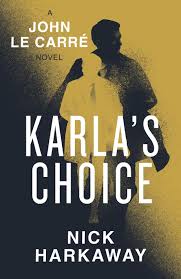
Nick Harkaway, Karla’s Choice: A John le Carré Novel (London: Penguin Viking, 2024)
GEORGE Smiley, the anti-hero agent, appears in nine novels written by John le Carré who died in 2020. Smiley has a vast following because he is the antithesis of the absurd and hyperactive James Bond. On the screen he was memorably portrayed by Alec Guinness. Smiley was an espionage officer as much as a spy, a seemingly unremarkable man. The purpose of espionage is to assess what is likely to happen and this was the work of the Circus, Le Carré’s fictional name for MI6, which was able to exercise muscle when required to reinforce Smiley’s cerebral skills.
He first appears in 1960 and some of his roles are fleeting. But in the sequence, there is a crucial gap from 1963 to 1974, which Le Carré’s son Nick Cornwell (Harkaway) now begins to fill. His story takes place in 1963 leaving considerable potential for further writing, and follows the recent deaths of Alec Leamas and Liz Gold at the Berlin Wall, climax to the brilliant Spy who Came in from the Cold.
The plot is straightforward. Moscow Centre (the KGB) sends an assassin to London to eliminate László Bànàti, a Hungarian emigré who runs a literary agency. The killer has a crisis of conscience and turns himself in, but the target has done a runner. Smiley is recalled from retirement and deduces that Bànàti is Ferencz Róka, a veteran Soviet agent from the 1930s and a sleeper who has gone in search of his dissident son, apparently arrested and released in Berlin. The aim of the Circus is to extract father, son, and his mother who is a Budapest academic.
Some decades ago, a British weekly (probably the New Statesman) ran a competition naming a topic and inviting readers to submit a passage after the style of a famous writer. It was said, maybe apocryphally, that Graham Greene had entered anonymously but failed in the competition evoking his own name. So, how does Nick Harkaway compare with his father?
The storyline is authentic enough and the central theme of the vulnerability of operatives to family crises was used by Le Carré himself in Smiley’s People. Smiley’s Circus colleagues are there: Bill Haydon, Toby Esterhase and Peter Guillam together with Connie Sachs and the Aunts. But in Le Carré’s Circus women were researchers and analysts, not field operatives. This is surprising since some of the most successful wartime agents were women: over forty of them worked in occupied Europe, among them the extraordinary Violet Szabó.
Le Carré’s world of espionage was largely male, denying recent history. Harkaway rectifies this by bringing into his story Szuszanna Gero, a young woman who had fled Hungary in 1956 and worked in London for Bànàti, whom she saw as a father figure. Recruited, perhaps exploited, by Smiley as part of his extraction operation she goes solo with alarming consequences in Budapest.
Smiley’s long-time Moscow Centre antagonist Karla wins this round, which ends in Lisbon, the first of many; and perhaps now, many more?
- A statue of Violet Szabó is located on the south bank of the Thames outside Lambeth Palace.